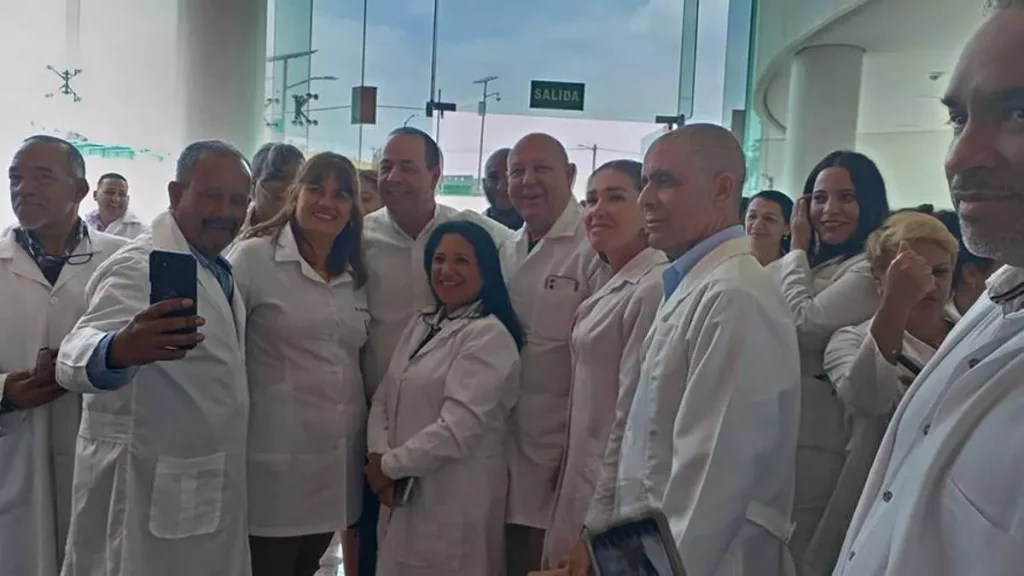1,550 of the 5,000 doctors hired by the López Obrador government have already arrived.

![]() 14ymedio, Mexico City, 23 August 2024 — the arrival, on Wednesday, of some 200 Cuban doctors at Felipe Angeles International Airport (AIFA), there are now almost 600 specialists from the island sent to Mexico in just 20 days. Two similar groups of 200 and 199, respectively, landed on August 2nd and 8th.
14ymedio, Mexico City, 23 August 2024 — the arrival, on Wednesday, of some 200 Cuban doctors at Felipe Angeles International Airport (AIFA), there are now almost 600 specialists from the island sent to Mexico in just 20 days. Two similar groups of 200 and 199, respectively, landed on August 2nd and 8th.
The doctors are met at the air terminal by diplomatic personnel and agents of the National Migration Institute. Afterwards, they are transported in official vehicles to Mexico City, from where they depart to other parts of the country.
According to the agreements signed between the two countries, the Cubans have been hired by the Andrés Manuel López Obrador Administration to fill positions in rural hospitals. These groups that arrived in August will join the 950 doctors that have arrived in the country since 2022, a figure that Mexico expects will reach 5,000, following the extension of the bilateral collaboration agreement, announced at the end of July.
None of the Mexican authorities made a statement on the matter or officially announced their meeting with the Cuban envoy.
The arrival of the specialists coincided with the Cuban Minister of Public Health, José Angel Portal Miranda’s visit to Mexico. The official met with his Mexican counterpart, Jorge Alcocer, and although a statement issued by the Cuban ministry reported the meeting, aimed at “strengthening collaboration in health matters”, the Mexican media have not reported the trip.
Alcocer is the highest-ranking official to receive Portal Miranda, albeit in a discreet way, a month before President López Obrador hands over power to Claudia Sheinbaum. He was also received at the Mexican Social Security Institute (IMSS) by Alejandro Calderón Alipi, general director of Health Services of IMSS-Bienestar, which is the institution taking in all the Cuban doctors sent to Mexico from 2022.
None of the Mexican authorities made any statement on the matter or officially announced their meeting with the island’s envoy. On the other hand, the Ministry of Public Health assures in its statement that in the meeting with Alcocer, they evaluated the progress of the collaboration in health matters, “which in the last period of work has been strengthened, consolidated and increased, reaching not only the health care area but also the teaching and regulatory field”.
Portal Miranda’s stay has gone by without raising much attention in the Mexican media.
In the same statement, they brag about the actions they have carried out “jointly”, without mentioning any of them, and assure that “the results that have been achieved” are proof of the will to continue working to “promote cooperation in health in different areas”, in spite of “obstacles and limitations”, which they did not provide in detail either.
Cuba’s ambassador to Mexico, Marcos Rodriguez, also alluded in a tweet to talks on the “cooperation of medical specialists” and the “production of medications and shared interests”.
In other activities, Portal Miranda participated in the XI Pan American Conference for the Harmonization of Pharmaceutical Regulation (CPARF), where he ratified Cuba’s “willingness” to “put at the service of the Pan American Health Organization and all the countries of the region, its technical capabilities and experience in the production of medications, biotechnological products and vaccines”.
In his speech, from the central building of the Mexican Foreign Ministry, which served as the venue for the meeting, Portal Miranda said that on the island “in the face of external limitations”, they have learned that the most secure resources they can have are those they are capable of producing on their own.
